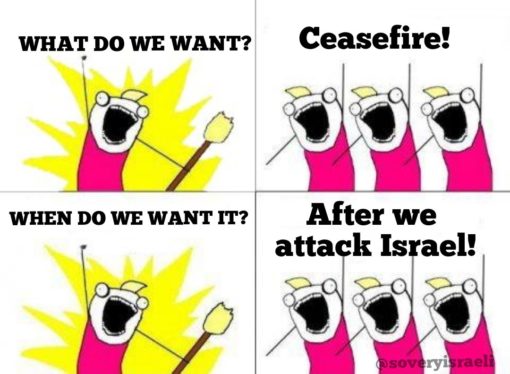WHAT DO WE WANT Ceasefire WHEN DO WE WANT IT After we attack Israel
The humor in this sentence arises from a form of irony often utilized in comedic writings: that of saying something which is starkly contrasted with a presumed or expected idea. Typically, the phrase "What do we want? When do we want it?" is associated with peaceful protests where groups are voicing demands for generally constructive or positive goals. The phrase encapsulates the urgency and unity in the crowd. This sentence spins that structure on its head by presenting a demand for a ceasefire—an implicitly peaceful action—but it is humorously contradicted by the timing "after we attack Israel."
This humor comes from incongruity; the two parts of the sentence are inherently contradictory. A “ceasefire” implies a desire for peace, yet this is immediately followed by the appropriate timing given, which is “After we attack Israel.” The irony here is stark. The supposed advocates for peace are, in the same breath, promoting an act of aggression. This discrepancy between what the demonstrators seemingly want, and their intended plan of action is what creates the humor.
Irony is a rhetorical device, literary technique, or event in which the outcome is significantly different from what was expected or intended. If we thread along the lines of irony, this statement can be seen as exhibiting situational irony. The words express a desire for peace (ceasefire) but ironically, only after initiating a conflict (attacking Israel). This contradiction makes the sentence both ironic and humorous.
There’s also an element of satire in this sentence that adds to its humor. Satire often uses irony to criticize or mock human vices, such as hypocrisy. This statement, albeit in a humorous way, highlights the hypocrisy of calling for peace while planning for war, which can be seen in various real-world scenarios.
Taking a step back to look at broader implications, it can also be a reaction to the complex and seemingly unsolvable nature of the Israeli-Palestinian conflict. The irony and humor here point out the often cyclical and contradictory nature of these conflicts: groups often directly contribute to the very violence they claim to want to stop. This irony can be a coping mechanism for the seemingly absurd reality of such violent conflicts.
In essence, this sentence uses the surprise of contradiction (peace after violence), situational irony (actions contradicting stated intentions), and a twisted form of satire (mocking the hypocrisy in conflict-driven politics) to create humor. For some, this statement might evoke laughter as it casts an absurd light on contentious socio-political situation and human behaviors therein. Others may see it as dark humor, using its levity to bring attention to a tragic and complex issue. WHAT DO WE WANT Ceasefire WHEN DO WE WANT IT After we attack Israel
